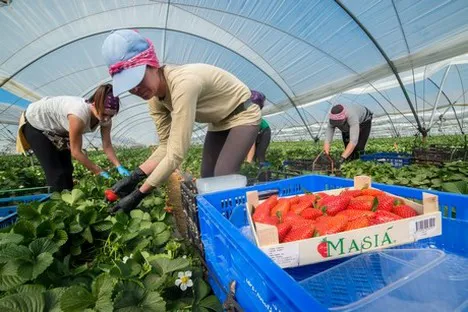Huelva's berry campaign is advancing with much lower volumes than usual due to the delay of the harvests caused by the different consecutive cold waves. Temperatures are rising again, but production is not expected to fully regain its capacity until week 13 or 14.
"We are collecting many fewer kilos than last year, which was already a year of low production," stated Carlos Masiá, Director of Purchasing and Marketing at Masiá Ciscar, based in Lepe, Huelva, which usually produces 15 to 20 million kilos of berries annually.

"Right now, we have 40 to 50% of the strawberry production that we should have at this time of the year. We had a hot November and December, which caused the plant to vegetate quickly, but in mid-January, the temperatures suddenly plummeted, and we have had more cloudy days, which has since stopped the growth of the fruits," he said.
Demand, therefore, far exceeds supply, Carlos Masiá added. "Normally, at this time of the year, strawberry prices tend to adjust a little because there is more production. This year, however, they are staying high because the supply of Spanish strawberries is limited, something that Morocco has taken advantage of to extend its campaign."
"Production is very late, but it's finally going to come out. It remains to be seen how the central European countries will begin their production when we recover the kilos. In principle, it's been cold for everyone, and the production in greenhouses with artificial light and heating is incipient due to the high energy costs, which could leave space for Spanish production. At the moment, we do not expect the offer to fully recover for the next 3 or 4 weeks," he added.
Masiá Ciscar is now working with its own Leticia and Palmeritas varieties. "Despite the seriousness of the situation, the Palmerita variety has yielded good kilos, and we've had a good campaign. We also have the Cozumel and Sandra (MC18-20) varieties, two new varieties of our own program that we'll launch in the coming campaign. We have great expectations for them because they offer a very long shelf life, good yields, and the flavor that characterizes us," he added.
For more information:
Carlos Masiá
Masiá Ciscar
Ctra. de La Redondela, Km 1,2
PO Box 79 - 21440 Lepe. Huelva. España
Tel.: 34 959 383 301
Email: [email protected]
www.masiaciscar.es
